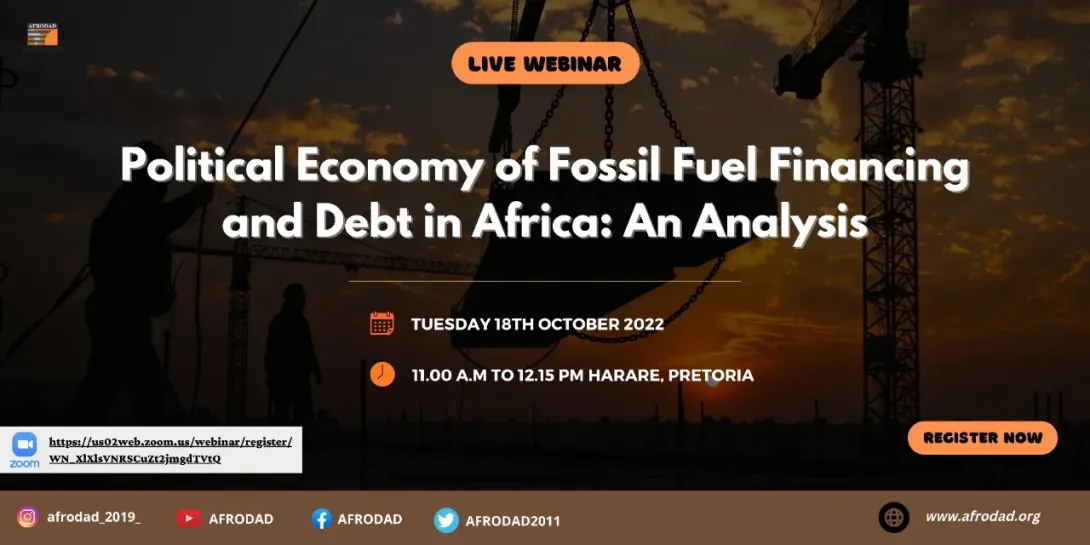The African Forum and Network on Debt and Development (AFRODAD) is hosting a webinar titled” Analysis of Political Economy of Fossil Fuel Financing and Debt in Africa” on Tuesday 18 October 2022 from 11:00 to 12:15 Harare, Pretoria Time.
Webinar Agenda
to present the completed briefing paper on Analysis of Political Economy of Fossil-Fuel Financing and Debt in Africa, its findings and policy recommendations. The discussion will be centred on theimpact of fossil fuel financing on the environment and climate change and the debates between the first world countries and developing countries regarding putting a halt to extracting fossil fuels and their financing, including economic implications of such a step on developing countries.
After the validation webinar, the study will be uploaded on the website and shared widely.
Background
The fossil fuel role in the energy space is significant to African countries given their need for economic development and access to electricity. This coincides well with the UN Sustainable Development Goal 7 on energy access and goal 1 on reducing poverty. The continent is composed of 42% oil, 28% gas, 22% coal, 6% hydro energy and a 1% nuclear energy. There are new discoveries of new oil and gas in Mozambique, South Sudan, Ethiopia and this shows a bigger role that fossil fuel energy can play in terms of better access to energy for the continent. A wholesome transition away from fossil fuels is not expected nor is it desirable as African countries are still in need of fossil fuel energy to boost energy accessibility and electrification. A just transition is a necessity for African countries as this will enable them to move bit by bit from fossil fuel energy use to renewable energy that is clean. However, fossil fuels have a risk of stranded assets, and their continual use can technologically lock out African countries. That is African countries will be left without the relevant infrastructure and technologies to transition and unable to change course.
The global North has been on a bigger role of financing fossil fuel projects in Africa, and this can further the impacts of climate change and risks African community due to climate change impacts. There is a general foreign control of African fossil fuel resources, and this does not benefit Africa in job creation due to poor contract terms and injected funds that can lead to debt trap. Negative impacts are incurred by African countries such as pollution, climate change and food insecurity. Vast investments in fossil fuel sector undermine potential of Africa’s renewables. Africa receives 2% of investment into renewable energy annually. There is a failure to realise a just transition in Africa due to continued utilization of fossil fuels. Lack of public finance for R&D for renewable energy, clean energy technologies, unwillingness of investors to take investment risk due to change in policies and the amount of capital involved in Renewable Energy Transition are some of the technical challenges associated with extended use of fossil fuels.
CLICK ON THE LINK BELOW TO REGISTER
https://us02web.zoom.us/webinar/register/WN_XlXlsVNRSCuZt2jmgdTVtQ
After registering, you will receive a confirmation email containing information about joining the webinar.

